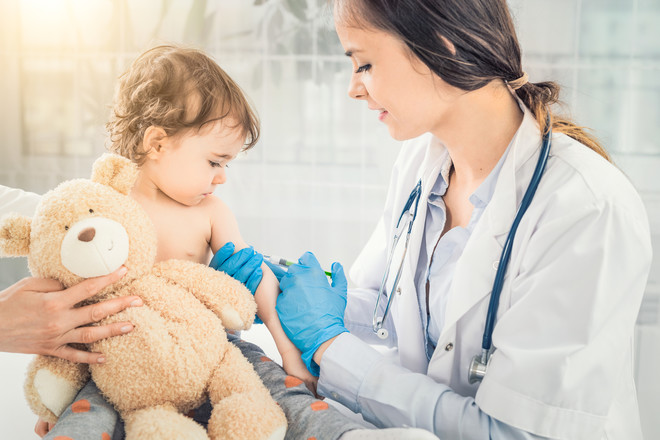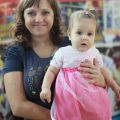This is only "good doctor Aibolit" from a fairy tale.Korney Chukovsky makes a happy smile on the face of the baby. In real life, a child, barely seeing an aunt in a white robe, can fall into a decent tantrum. But you have to go to the children's clinic quite often, and not only because of illness. We are sorting out how to set up a child to visit the doctor so that the reception will be quiet and calm. “During my childhood, the most terrible seemed to be a dentist. Even boys started to cry before the dental office. And although modern medicine has since gone far ahead, children are still afraid of the dentist, vaccinations and injections. And kids - even standard examinations, ”says blogger, author of the book“ Children about doctors, ”Alexander Charikov. Mom-blogger Alexandra Charikova Photos: personal archive “I myself faced this problem: my daughters at an early age were afraid of simple regular check-ups at a pediatrician. And all because they did not know what would happen outside the door of the medical office. And the standard phrases from the category of “it won't hurt” a child in such a situation will not be reassured. As soon as I understood that girls need an understanding of what is happening, the situation has improved. Now the eldest daughter proudly says that she was the most courageous in the medical room in the kindergarten, and the youngest one calmly comes to the receptions, playing and willingly communicating with the doctors. ”
Mom-blogger Alexandra Charikova Photos: personal archive “I myself faced this problem: my daughters at an early age were afraid of simple regular check-ups at a pediatrician. And all because they did not know what would happen outside the door of the medical office. And the standard phrases from the category of “it won't hurt” a child in such a situation will not be reassured. As soon as I understood that girls need an understanding of what is happening, the situation has improved. Now the eldest daughter proudly says that she was the most courageous in the medical room in the kindergarten, and the youngest one calmly comes to the receptions, playing and willingly communicating with the doctors. ”
How to prepare a child for a visit to the clinic
Tell your child what to expect at the appointment.doctor. What diseases does this doctor treat, how will the appointment proceed. For example, an ENT specialist will examine the ears, throat and nose, listen to breathing. The main thing is to speak in simple language, without lying or overloading with incomprehensible information. It seems to me that such conversations should be held with a child starting from one year old, so that he does not encounter an unpleasant surprise in the doctor's office. Play doctor and patient. Role-playing games are useful before going to the clinic. In a form accessible to him, the child will learn exactly how the doctor works. You can buy a toy set with medical instruments, and take a doll or a favorite teddy bear as a patient. Examine the bear's throat, take blood for analysis, listen to its heart. A favorite toy will help to cope with fear. "His" toy in the doctor's office can support the baby at such a crucial moment. Especially if it is a favorite and accompanies the child in different situations. It is good if the doctor's office already has toys or a children's playroom. New dolls and cars can interest the baby more than his own. And let's not forget that there is no better support for a child than the presence of a mother, father or other loved one with whom he feels calm and happy. Photo: Getty Images
Photo: Getty Images
Forget about these phrases.
"It won't hurt." First of all, it's a lie.Secondly, the child will only hear the word "painful". It is better to explain to him why this unpleasant procedure is necessary - an injection or blood sampling. Confidently, without strain and unnecessary emotions. Very young children will not understand right away, but they will still remember something. And, therefore, a positive and understandable image will be formed. "If you don't take the medicine, I'll call the doctor." You don't want to turn the doctor into a hero from a scary fairy tale, do you? "If you don't get treated at home, you'll be hospitalized." These words will help create a scary image of all medical institutions in the child. "If you don't wash your hands, your stomach will hurt and you'll end up in the hospital." You can teach your child personal hygiene without such "horror stories." Personally, I believe that your own example and the right, positive message will help here. It is better to talk about the benefits of a hygiene procedure or any other daily ritual that the child does not want or forgets to do. For some, it is important that he will have strong teeth and a beautiful smile, since he eats cottage cheese. Some people may be more likely to be told that they fight bacteria using soap. This can be done in a playful way. For example, tell them that in order to fight the microbes that inhabit the Earth, they need to put on “magic gloves” made of soap foam. Try different options, offer them to your child and see what works best. “The bad sofa offended our girl.” How often, when a child painfully hits the corner of a piece of furniture, parents immediately begin to scold the “offender.” This is only acceptable in early childhood, when such phrases will help the child distract himself from the pain. But scolding the sofa together with a five-year-old is definitely not worth it. Please note The book is distributed free of charge at the Lakhta Junior Children's Medical Center, Children's City Hospital No. 1, Children's City Hospital No. 19 named after K.A. Raukhfus, Children's City Clinical Hospital No. 5 named after N.F. Filatova, Trauma Center of Children's Hospital No. 2 of St. Mary Magdalene, and is also sold in Subscription Editions and Ptenets.









